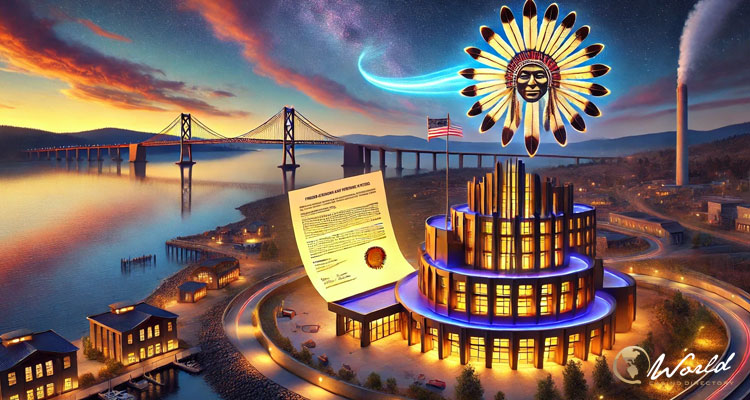The Scotts Valley Band of Pomo Indians has reached a significant milestone in its effort to establish a $700 million casino resort in Vallejo, California, after the U.S. Department of the Interior approved the request to place 160 acres of land in federal trust. This approval will pave the way for the tribe to develop the site into a large-scale casino resort, marking a crucial step in their long-running efforts to reclaim land and improve their community’s economic standing. The decision, made official by the Biden administration, will be recorded in the Federal Register early next week.
Controversial project details:
This land, located at the intersection of Interstate 80 and State Route 37, is set to host the tribe’s controversial casino development, which includes a 400,000-square-foot casino, 24 homes for tribal members, an administration building, and a 45-acre biological preserve. The project aims to generate significant economic opportunities, both for the tribe and for the surrounding Vallejo area. According to the tribe’s leadership, the project could create thousands of jobs during construction and throughout ongoing operations, while also stimulating local businesses in Solano County.
“We’ve been fighting for at least three decades to reclaim our community,” said Shawn Davis, Chairman of the Scotts Valley Band of Pomo Indians. “This land will not only provide our people with a home, but it will also enable us to achieve economic development for ourselves and our neighbors.”
Opposition from local and state officials has been fierce. California Governor Gavin Newsom, for example, voiced concerns over the tribe’s connection to the Vallejo area, suggesting that the tribe lacked historical ties to the land. Additionally, the project has drawn the ire of the Yocha Dehe Wintun Nation, a federally recognized tribe that claims the land as part of its cultural heritage. The Yocha Dehe Wintun Nation operates the Cache Creek casino in nearby Woodland and has expressed vehement opposition to the Scotts Valley project. They argue that the new casino would desecrate sacred Patwin lands and resources.
“We are deeply disappointed by this decision,” said Anthony Roberts, Chairman of the Yocha Dehe Wintun Nation, as reported by Times-Herald Online. “To see our land and cultural resources taken away for the benefit of wealthy investors is painful beyond words.”
Legal and environmental challenges:
The tribe’s legal battles and environmental concerns have played a central role in the development controversy. In 2019, the Trump administration rejected the project, citing a lack of historical connection to the land. However, a federal court ruled that the rejection was “arbitrary and capricious,” leading to a reversal of that decision under the Biden administration. Furthermore, critics have highlighted the limited environmental review process conducted by the Department of the Interior, which failed to meet the more stringent requirements of a full Environmental Impact Statement.
Despite these challenges, the project is moving forward. Patrick Bergin, the attorney for the Scotts Valley Band of Pomo Indians, indicated that while litigation to block the project is a possibility, the tribe is proceeding with the necessary steps to continue its development, including negotiations with the city of Vallejo and securing a gaming compact with the state of California, as Open Vallejo reports.
“The tribe is committed to creating a project that benefits both our people and the surrounding community,” said Bergin. He emphasized that the tribe’s vision is one of long-term prosperity and self-sufficiency, built on a foundation of community collaboration and economic growth.
Vallejo’s involvement and community concerns:
Vallejo’s City Council, which has voiced support for the casino project, passed a resolution in November to enter into a Cooperative Agreement with the tribe. While the council recognizes the potential benefits, there have been concerns about the scale of the project and its impact on local infrastructure. Former Vallejo Mayor Robert McConnell raised questions about the need for 160 acres of land, particularly considering the inclusion of a substantial biological preserve.
Gregory Lee, the Southern Nevada hotel-casino operator overseeing the project, praised the approval, calling it a “tremendous opportunity” for both the tribe and the city of Vallejo. Lee, who has longstanding business ties to the area, emphasized the positive economic impact that the casino could have on Vallejo and Solano County.
Despite the hurdles, the approval of the land into trust status represents a crucial victory for the Scotts Valley Band of Pomo Indians, who have long fought for recognition and rights over their ancestral lands. The tribe’s struggle to reclaim their heritage includes the dark history of the Bloody Island Massacre in 1850 when U.S. cavalry killed hundreds of Pomo people in a brutal attack. This dark chapter, along with the tribe’s decades-long battle for federal recognition, highlights the ongoing efforts of Indigenous groups to secure their cultural, political, and economic futures.



